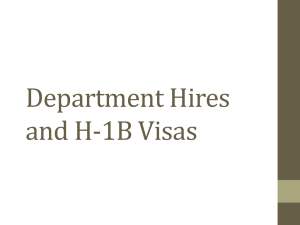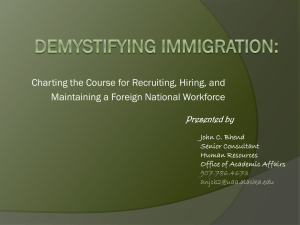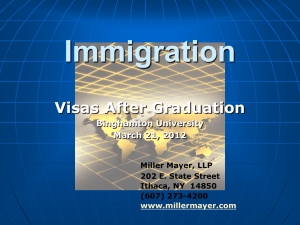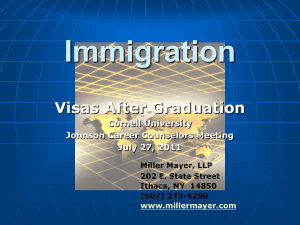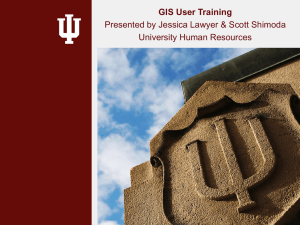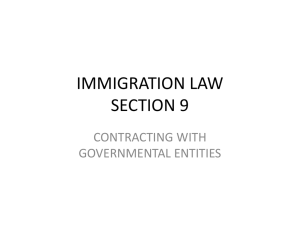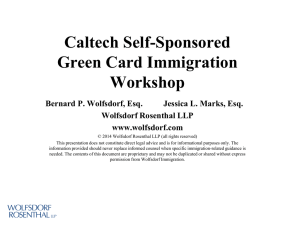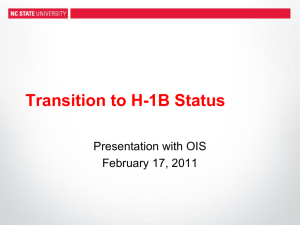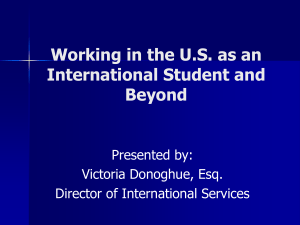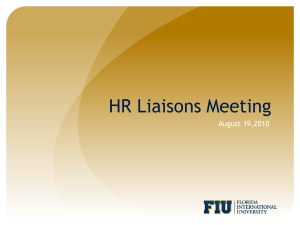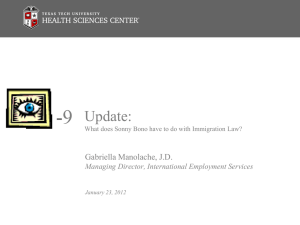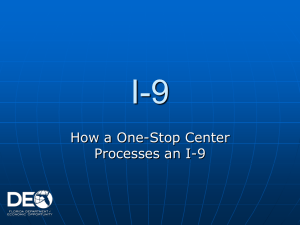Hot Topics in Business Immigration Law
advertisement
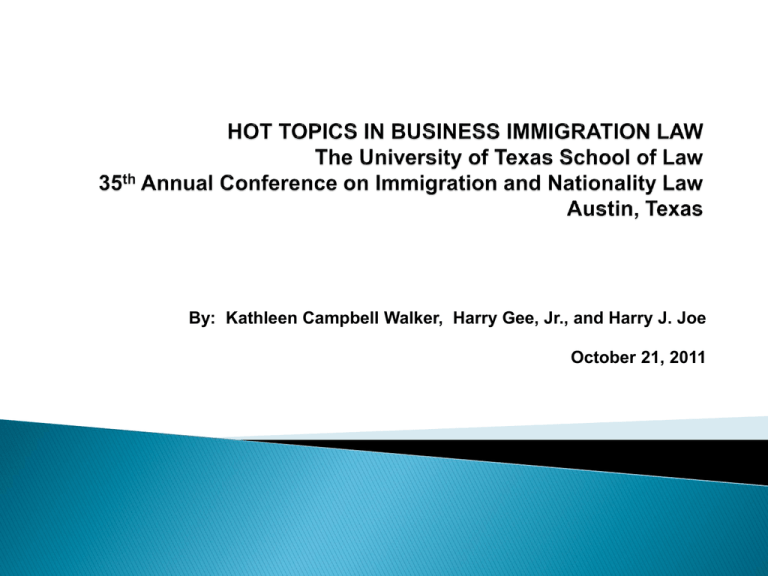
By: Kathleen Campbell Walker, Harry Gee, Jr., and Harry J. Joe October 21, 2011 October 11 - USCIS is following up as to Startup America initiative of the White House to celebrate, inspire, and accelerate high-growth entrepreneurship throughout the nation. USCIS is: Conducting a review of the EB-5 process Working with business analysts to enhance the EB-5 adjudication process Implementing direct access for EB-5 Regional Center applicants to reach adjudicators quickly; and Launching new specialized training modules for USCIS officers on the EB-2 visa classification and L-1B nonimmigrant intra-company transferees. Sole Shareholders/Employees and the H-1B category – The H-1B category requires the establishment of an employer/employee relationship for H-1B beneficiaries. A USCIS memorandum had drawn into question further the ability of any H-1B employer “controlled” by the beneficiary as being able to obtain an H-1B petition approval, because of the difficulty in meeting the required employer/employee relationship. The clarification provided by USCIS confirms that there must be a right to control established by the petitioner over the employment of the H-1B beneficiary. USCIS further notes, however, that "if the petitioner provides evidence that there is a separate Board of Directors which has the ability to hire, fire, pay, supervise, or otherwise control the beneficiary, the petitioner may be able to establish an employer-employee relationship with the beneficiary." EB-2 Immigrant Entrepreneurs and the National Interest Waiver – The EB-2 immigrant visa category may be used by foreign nationals with exceptional ability to avoid the normal permanent labor certification process of the Department of Labor (DOL). This option is referred to as Schedule A, Group II precertification. The USCIS clarification provided, however, focuses on the national interest waiver option of the labor certification available in the EB-2 immigrant visa category for those with qualifying exceptional ability. The main benefit of the clarification provided may be to encourage adjudicators to be more accepting of the argument that the creation of jobs for U.S. workers may qualify applicants for a national interest waiver. The jury is certainly out on this particular "benefit." Expand Premium Processing – Those applicants attempting to acquire permanent residence as multinational managers or executives under the EB-1-3 immigrant visa category (multinational managers and executives) will apparently become eligible to request premium processing of their I-140 petitions. Streamline the EB-5 Immigrant Investor Process - The EB-5 immigrant visa category for individual investors as well as for those investing in an approved Regional Center has been unpredictable and confusing, and the process is lengthy. USCIS proposed accelerating its processing time for applications via the extension of premium processing and improving the expertise of adjudication teams. September 15, 2011 From the American Immigration Lawyers Assoc. DOL Liaison has received reports that members are beginning to receive PERM prevailing wage determinations for requests that were submitted as recently as June 23, 2011. If you receive a prevailing wage determination for a request submitted after June 23, please notify us at reports@aila.org, subject line: Prevailing Wage Update. September 12, 2011 On September 12, 2011, DOL posted additional information on its website regarding H-2B prevailing wage redeterminations (AILA Doc. No. 11091231), along with Q&As regarding the impact of prevailing wage delays on H-1B Labor Condition Applications and the use of alternative wage surveys as a means to avoid filing delays (AILA Doc. No. 11091232). September 9, 2011 On September 9, 2011, AILA and other stakeholders met telephonically with DOL for a follow-up call and update on the prevailing wage situation. The report from the DOL Liaison Committee (AILA Doc. No. 11091230) includes information on DOL’s current efforts to reduce the backlog of PERM prevailing wage requests, and DOL’s stated timeline for becoming current on all prevailing wage requests. Case No. 45-CV-201 Circuit Court of Lowndes Co., Alabama. Palmer v. Infosys Technologies Limited Inc. Whistleblower Action tied to use of B-1 Welcome Letters to attend meetings to send lower level and unskilled Indian nationals to the U.S. to work in full-time positions at customer sites . Employees remained on foreign payroll. Hearing on “The Economic Imperative for Enacting Immigration Reform” - July 26, 2011 – Senate Judiciary Subcommittee on Immigration, Refugees and Border Security Hearing on “The Economic Imperative for Enacting Immigration Reform” - July 26, 2011 – Senate Judiciary Subcommittee on Immigration, Refugees and Border Security – testimony by Jay Palmer at invitation of Senator Grassley Infosys created and internal website of do’s and don’ts such as “Do not mention activities like implementation, design & testing, consulting, etc., which sound like work. Also do not use words like, work, activity, etc., in the invitation letter. Please do not mention anything about contract rates as you’re on a B-1 Visa.” 58 Fed. Reg. 40024 (July 26, 1993) – DOS Proposed Rule 58 Fed. Reg. 58982 (November 5, 1993) – INS Proposed Rule Cease B-1 in lieu of H-1 Counter “job shop” abuse with ending contract for service options and require the foreign company to control all aspects of the B-1’s activities Matter of Pozzoli, 14 I & N Dec. 569 (1974) FLSA standards The FDNS Reports and Analysis Unit (RAU) looks at ASVVP cases referred to FDNS and the resulting Statements of Findings (SOFs) to determine fraud rates. In FY10, out of 15,083 ASVVP cases reviewed by Center Fraud Detection Offices at CSC and VSC (CFDOs), only 197 (1%) were referred to field FDNS IOs as fraud leads/cases. In FY11 YTD, the CFDOs have referred 46 cases to field IOs. FDNS doesn’t count adverse actions taken by Adjudications in the fraud rate. H-1B Cases H-1B Cases (86%) H-1B Cases (14%) H-1B Cases (1%) H-1B Cases (12%) Reviewed: Verified: 15,083 13,038 Not Verified: 2,045 Referred to FDNS: 192 Referred to Adjudications:1,853 Petitioner (business) does not physically exist Petitioner misrepresented the details of the beneficiary’s employment Beneficiary is not or will not be employed in the location or area certified Beneficiary is not or will not be performing the duties specified on petition Petitioner withdrew the petition Petitioner is not paying the beneficiary at the certified wage Beneficiary is not or will not be employed by the petitioner Sept. 20, 2011 ARB of DOL affirms settlement refused claims made by certain of the H-1B workers as well as the arguments of the Pilipino Educators Network that the debarment agreement would breach the school district’s promise to assist the H-1B workers to acquire U.S. legal permanent residence Administrative Judge Johnson also affirmed that an employer is responsible for paying “any fee required under §214(a)” of the Immigration and Nationality Act, as amended. (INA), but acknowledged that a settlement does not have to result in a full recompense of such expenses to the employee. Mohan Kutty, M.D., v. U.S. Department of Labor, (E. D. Tenn. at Knoxville no. 3:05-CV510 Phillips) The U.S. District Court for the Eastern District of Tennessee upheld a $1.1 million judgment by the DOL’s Administrative Review Board against the owner of a chain of medical clinics for the failure to pay required H-1B wages. (Sept. 2011) Dr. Kutty has appealed the decision to the Court of Appeals for the Sixth Circuit. The Tennessee federal district court in Kutty expanded an employer’s responsibility to include the payment of J-1 waiver-related fees, because an H-1B employer usually must provide an approval of this waiver with its H-1B petition for the foreign physician. The court’s order linked the H-1B petition to the required J1 nonimmigrant waiver for the physicians as an unauthorized business expense of the H-1B employer under 20 CFR §655.731(c)(7),(9) and (12). The Immigration and Nationality Act, §212(n)(2)(C), and relevant regulations at 20 CFR §655.731(c)(10)(ii) strictly prohibit an H-1B employee from paying the ACWIA fee. In addition, under 20 CFR §655.731(c)(10)(ii), if an employee pays an employer liquidated damages for early termination of the employment relationship, the liquidated damages cannot recoup this fee. If an employer depresses an employee’s wages below the required H-1B wage by requiring the employee to pay any of the employer’s business expenses, the DOL will deem the amount to be an unauthorized deduction from the employee’s wages, even if the expense is not reflected on the employer’s payroll records as a deduction, under 20 CFR §655.731(c)(12). For example, under 20 CFR §655.731(c)(9)(iii)(C), an employer may not recover “attorney fees and other costs connected to the performance of H-1B program functions, which are required to be performed by the employer (e.g., preparation and filing of LCA and H-1B petition).” Lawyers continue to debate whether unauthorized deductions, which do not depress the employees’ wages below the required wage, result in a regulatory violation. Oct. 12 Hearing - House Judiciary Committee's Subcommittee on Immigration Policy and Enforcement - ICE Director, John Morton As of Sept. 17, 2011, ICE had initiated 3,015 worksite investigations, 154 percent more than in fiscal year 2008; In fiscal year 2010, ICE arrested 196 employers for criminal worksite-related immigration violations, surpassing the previous record of 135 arrests in fiscal year 2008; So far in fiscal year 2011, ICE has also issued a record 2,393 I-9 audit notices of inspection, a 375 percent increase above the number issued in fiscal year 2008; In 2011, ICE has issued 331 final orders following worksite inspections totalling $9 million in fines levied on employers, compared to 18 final orders issued in fiscal year 2008 totaling $675,000. Oct. 12 Hearing - House Judiciary Committee's Subcommittee on Immigration Policy and Enforcement - Chairman, Lamar Smith Smith disagreed with these statistics, arguing that worksite enforcement has dropped 70 percent over the past two years due to ICE's decision to abandon large-scale worksite raids. “Their lack of enforcement allows illegal immigrants to fill the jobs that should go to unemployed American workers,” he said. While ICE “claims they have increased the number of employer audits,” such actions “do little to discourage illegal hiring,” Smith said. “Employers consider fines often just the cost of doing business,” he said. 8 U.S.C. Sec. 1324b • • • • Citizenship/Immigration status discrimination National origin discrimination Document abuse Retaliation DOJ – OSC - WHAT EMPLOYERS SHOULD DO: • Check no-match information against your personnel records • Inform employee of no-match notice • Ask employee to confirm Name/SSN as reported • Refer employee to local SSA office for assistance • Give employee reasonable period of time to resolve • Periodically communicate with employee on status of resolution efforts • Follow same procedures for all employees, regardless of citizenship status or national origin • Submit any employer or employee corrections to the SSA DOJ – OSC WHAT EMPLOYERS SHOULD NOT DO: • Assume no-match notice is evidence of undocumented status or lack of work authorization • Use no-match notice to terminate, suspend or take other adverse action against the employee • Follow different procedures for different employees based on national origin or citizenship status • Require employee to produce specific documents to address the no-match • Ask the employee to provide a written report of SSA verification By September of 2010, the DOJ increased the number of attorneys and investigators in the OSC by 25%. On July 1, 2010, the DOJ published press releases regarding a settlement with Macy’s regarding the alleged firing of a worker after a permanent resident card expired. (Of course, an I-551 permanent resident card, aka "Green Card" is only documentation of status and the status does not expire with the date on the card.) August 26, 2011 – Kinro Manufacturing Inc. of Goshen, Indiana paid a $25,000 civil penalty and $10,000 in back pay for subjecting newly hired non-U.S. citizens to excessive demands for documents issued by DHS to verify their employment eligibility. August 22, 2011 – Farmland Foods, Inc., a major U.S. pork producer agreed to pay $290,400 in civil penalties, the highest civil penalty paid via settlement of violations of the INA’s anti-discrimination provisions, for requiring the presentation of certain or excessive work authorization documents. May 31, 2011 – The American Academy of Pediatrics agreed to pay $22,000 in civil penalties for impermissibly limiting applications for positions to U.S. citizens and certain visa holders. On March 23, 2010, OSC issued a bilateral resolution dismissing a charge of document abuse and citizenship status discrimination filed by a LPR against Crestwood Suites. The lawful permanent resident alleged that Crestwood Suites terminated him after it ran his name through E-Verify and received a FNC. The parties entered into settlement agreement resolving the charge under which the charging party was reinstated and received full back pay of $3,200. (Durham, NC) In June 18, 2010, OSC issued a letter of resolution to The Pantry, Inc. (Pantry), dismissing a charge of document abuse. The charge alleged that the Pantry terminated the charging party, a U.S. citizen, after he received a TNC from E-Verify. The charging party had been employed by The Pantry for seven months before he was improperly run through E-Verify. In response to OSC’s investigation, the Pantry and the charging party reached an agreement providing that he would withdraw his charge in exchange for reinstatement and a payment of $3,500 to the Charging Party. The charging party rejected The Pantry’s offer of reinstatement. (Hilton Head, SC) On May 13, 2011, USCIS announced the availability of its new resource for employers regarding the completion of the I-9 form for new hires. I-9 Central is frequently updated and all postings are allegedly cleared by ICE, USCIS, and the OSC. I-9 Central currently provides more detailed information on acceptable documents for I-9 completion, correcting I-9s, how to complete an I-9, which I-9 forms to use, a retention formula, etc. The Citizenship/Document Matrix under the heading, "Who is Issued This Document?," is a new resource as to work authorization documentation for the I-9. One important point to remember is that I-9 Central does not have the force of law. USCIS will look to the M-274 Handbook for Employers as to the final word on I-9 compliance guidance. Thus, the utility of I-9 Central is still under review by employers and legal counsel alike. Any reliance by an employer on the contents of I-9 Central should be documented in the employer’s compliance file by retaining a copy of the relevant portions of I-9 Central used by the employer along with the date of the content. On August 16, 2011, USCIS expanded the Self Check eligibility confirmation system to include 21 states and the District of Columbia. Self Check is an on-line service offered directly to the public via E-Verify to help employees verify their work eligibility in the U.S. It is voluntary. Self Check is available to workers over the age of 16 to confirm their eligibility to work in the U.S. and to submit corrections to their DHS and SSA records, if needed Self Check USCIS webpage www.uscis.gov/selfcheck. Employers cannot require an employee or potential employee to use Self Check to prove work authorization. E-Verify is an internet based system operated by DHS that assists businesses in determining the identity and work eligibility of their new hires. Alabama, Georgia, Indiana, Louisiana, North Carolina, South Carolina, Tennessee, Utah, and Virginia all enacted E-Verify legislation, while Florida did so by executive order. © 2011, Cox Smith Matthews Incorporated 28 A rebuttable presumption is established that the Employer has not violated §274A(a)(1)(A) of the INA with respect to the hiring of any individual if it obtains confirmation of the identity and employment eligibility of the individual in good faith compliance with the terms and condition . No person or entity participating in E-Verify is civilly or criminally liable under any law for any action taken in good faith based on information provided through the confirmation system. DHS reserves the right to conduct Form I-9 and EVerify system compliance inspections during the course of EVerify, as well as to conduct any other enforcement activity authorized by law. © 2011, Cox Smith Matthews Incorporated 29 Employers seeking to participate in IMAGE must first agree to: Submit to an I-9 audit by ICE, and To ensure the accuracy of their wage reporting, verify the Social Security numbers of their existing labor force utilizing the Social Security Number Verification System (SSNVS). Upon enrollment and implementation of DHS’s best hiring practices, program participants will be deemed “IMAGE Certified” - a distinction DHS believes will become an industry standard. © 2011, Cox Smith Matthews Incorporated 30 Not subject to a subsequent Form I-9 inspection for a period of two years, from the date of Form I-9 inspection completed as part of the IMAGE certification process, absence the existence of specific intelligence of unlawful employment. Mitigate/Waive fines if substantive violations are discovered on fewer than 50% of the Forms I-9. In instances where more than 50% of the Forms I-9 contain substantive violations, ICE will issue fines at the statutory minimum of $110 per violation. © 2011, Cox Smith Matthews Incorporated 31 More than 40 percent of the 2010 Fortune 500 companies were founded by immigrants or their children. Even though immigrants have made up only 10.5 percent of the American population on average since 1850, there are 90 immigrant-founded Fortune 500 companies, accounting for 18 percent of the list. When you include the additional 114 companies founded by the children of immigrants, the share of the Fortune 500 list grows to over 40 percent. The newest Fortune 500 companies are more likely to have an immigrant founder. A little less than 20 percent of the newest Fortune 500 companies — those founded over the 25-year period between 1985 and 2010 — have an immigrant founder. The revenue generated by Fortune 500 companies founded by immigrants or children of immigrants is greater than the GDP of every country in the world outside the U.S., except China and Japan. The Fortune 500 companies that boast immigrant or children-of-immigrant founders have combined revenues of $4.2 trillion. $1.7 trillion of that amount comes just from the companies founded by immigrants. Introduced by Rep. Raul Labrador – American Innovation and Education Act of 2011 Allow foreign graduates of U.S. universities who received their degrees in a science, technology, engineering, or math field to remain in the United States and receive a green card promptly when sponsored by an American employer, according to a summary from the congressman's office. On 9/22/11, Congressman Jason Chaffetz (R-UT) along with Chairman Lamar Smith (R-TX) introduced H.R. 3012, the "Fairness for High-Skilled Immigrants Act". The bill eliminates the current per country cap limits of 7% on all employmentbased green card categories over a three year transitional (phase-in) period leading to a strictly “first in, first out” (based on priority dates) system within the existing EB category system. The measure immediately increases the family-based per country cap from 7% to 15%. During the three year phase-in of the “first in, first out” employment based system— no group of applicants from a single country may receive more than 70% of employment based visas. The effective date of this measure would be as if enacted on September 30, 2011. Effective date as if enacted on 9/30/11. On 10/6/11 Congresswoman Lofgren (D-CA) and Congressman Gutierrez (D-IL) introduced H.R. 3119, the "Protecting American Families and Businesses Act of 2011" a bill that includes the provisions contained in H.R. 3012, as well as some additional provisions and with an implementation date of the beginning of fiscal year 2013. The employment related provisions include expanding certain AC-21 protections to include L and F visa holders (allowing them to get an extension on an expiring visa if their employer files a permanent residence petition on their behalf). F visa holders would also be allowed dual intent. H.R. 3119 also includes provisions that would recapture unused employment-based and family-based green cards. Rep. Lofgren’s Immigration Driving Entrepreneurship in America (IDEA) Act of 2011 addresses many of the critical issues faced by companies in need of highly skilled workers. The bill allows U.S. companies to have access to, and retain, highly skilled foreign graduates from U.S. universities who studied in the fields of science, technology, engineering and math (STEM). Allows businesses to attract and retain successful innovators by creating a new “EB-1” green card category for advanced degree holders in STEM fields from certain U.S. universities that excel in STEM instruction. Exempts these advanced STEM degree holders, as well as persons who qualify under the current EB-1 category for “outstanding professors and researchers,” from numerical limits. Incentivizes economic growth and job creation by creating a new green card category for entrepreneurs who establish new start-up businesses and create jobs for American workers. Provides “conditional” green cards to two types of entrepreneurs: Venture Capital-Backed Start-Up Entrepreneurs and Self-Sponsored Start-Up Entrepreneurs. “Recaptures” employment-based and family-based green cards that were authorized under current law but went unused due to government delays; also ensures that available visas will no longer go to waste in the future. Eliminates employment-based “per country” levels so that all workers are treated fairly and employers can hire the most skilled workers without regard to national origin; also changes family-based per-country levels from 7% to 10%. HR 2885 Legal Workforce Act – Introduced by Lamar Smith – House Judiciary Committee approved on 9/21/2011 Preemption provision in place Close “loophole” as to returning agricultural workers being considered new hires Mandates E-Verify for New Hires Kathleen Campbell Walker Partner Harry Gee, Jr. Law Office of Harry Gee Jr. @ Associates APC Cox Smith Matthews Incorporated 221 N. Kansas, Suite 2000 Suite 2950 PH El Paso, Texas 79901 5847 San Felipe Tel: 915-541-9360 Board Certified in Immigration and Nationality Law, Houston, Texas 77057 Texas Board of Legal Specialization Tel: 713-781-0071 kwalker@coxsmith.com hgee@harrygee.com Harry J. Joe Jackson Lewis LLP 3811 Turtle Creek Blvd. Suite 500 Dallas, TX 75219 Tel: 214 -273- 5060 Board Certified in Immigration and Nationality Law , Texas Board of Legal Specialization joeh@jacksonlewis.com
